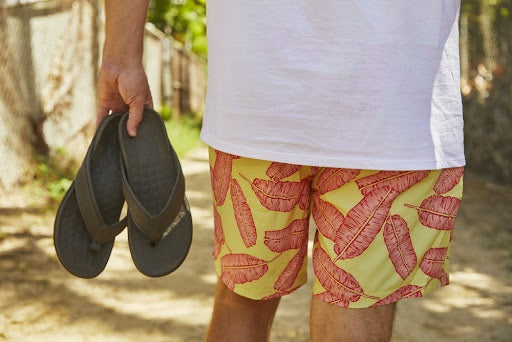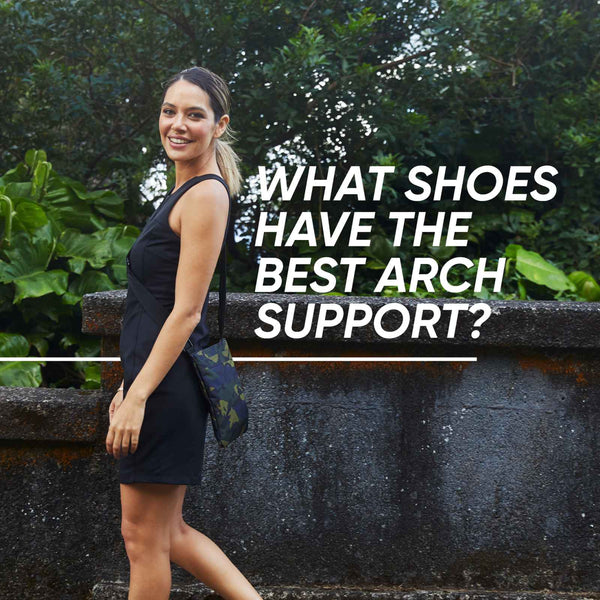Do Flat Feet Need Arch Support?


If you have fallen arches, you’re not alone. Around 15% percent of adults in the United States suffer from the condition.¹ Though it’s a little more common in women than men, flat feet can affect anyone.
Having flat feet means your arches touch the floor when you’re standing up straight. The condition can be genetic, and while some infants are born flat-footed, many individuals develop the condition later in life. For some people, fallen arches are an effect of getting older or suffering from an injury. It can also occur during pregnancy or as a result of obesity or other chronic illnesses like rheumatoid arthritis and diabetes.
Check out our blog on how to tell if you have flat feet for an in-depth discussion on how the condition develops.
In some instances, folks with flat feet don’t experience any symptoms, and yet for many, it can cause immense pain and discomfort. With that said, those with fallen arches often wonder, Do flat feet need arch support? Though shoes can’t cure or reverse the condition, supportive footwear can help alleviate the aches and pains of having flat feet.² Often, those with flat feet need wide width shoes. Here’s what you should know.
Why Do You Need Arch Support for Flat Feet?
Here at Vionic, we’re dedicated to offering podiatrist-design footwear to people from all walks of life, and we know the art of easing various foot ailments. If you experience ongoing discomfort from a flat-foot deformity, proper support may help relieve some of your woes.
Flat feet need arch support when the condition contributes to:
- Persistent stress
- Muscle soreness
- Poor posture
- Imbalance
- Alignment issues
- Plantar fasciitis (heel pain)
- Ongoing foot pain
- Overpronation
Wearing shoes with arch support can make not only your feet but your whole body feel notably better. Additionally, without adequate arch support, fallen arches may lead to overuse injuries.
If you’re lucky enough not to experience any discomfort from the condition, going through great lengths to correct it, it may not be necessary. However, supportive footwear can benefit anyone, regardless of whether they have a foot deformity.
How to Find Arch-Support Shoes for Flat Feet
There are various clinical and at-home therapies you can try for remedying fallen arches, like physical therapy, stretching, strengthening exercises, rest, and potentially foot surgery. Having said that, orthotic shoes can make the biggest difference.³
The best shoes for flat feet offer relief from foot aches and pains while helping to prevent injuries.⁴ When browsing styles, look for options with contoured arch support, shock absorption, and heel stability. You’ll also want to make sure to get the proper size and width.

Contoured Arch Support
Orthotic shoes with built-in arch support feature contoured footbeds, which can be immensely beneficial for people with flat feet. By providing plenty of support throughout the arch area, this type of shoe decreases pressure in the plantar fascia (the tendons connecting your forefoot to your heel). As a result, wearing contoured footwear might help you avoid plantar fasciitis (or alleviate heel pain for those who already have the condition).
Individuals with low arches are also often prone to shin splints. Shoes with flat foot arch support can help prevent this painful inflammation while reducing the chance of an overuse injury. This is particularly important for athletes and folks who count their steps for exercise.
By minimizing pressure on the arches, the orthotic shoe design relieves stress on the Achilles tendon and helps prevent rolled ankles as well. Contoured footbeds can help with overpronation too.
Shock Absorption
Another essential component is shock absorption. When your feet hit the ground, orthotic footbeds absorb the impact of your stride. This reduces stress throughout your hips, calves, and ankles while minimizing rubbing. Look for shoes with the appropriate insole that is flexible but not too flimsy.
Heel Stability
Heel stability is also crucial for people with fallen arches. Your footwear should feature deep heel cups with firm support throughout the bottoms and backs of your feet. A sturdy, supportive heel will prevent your foot from rolling inward with each step you take, which helps reduce overpronation.
Proper Size and Width
Lastly, the importance of wearing the right size and width can’t be overstated. Proper sizing should be a priority for everyone, but it’s especially critical for those with flat feet.
We recommend carefully measuring your feet to ensure the width and length align with the size you purchase. Wearing shoes that are too short, long, wide, or narrow can create a range of foot problems, like chronic pain, alignment issues, cramping, muscle strains, blisters, ingrown toenails, or severe overpronation.
Flat-footed folks often need wide widths because the broader toe boxes provide enough room for your toes to wiggle around. But whether you go for a standard or wide width, it may be best to avoid narrower silhouettes, like pointed flats, which can create uncomfortable restrictions. Check out our collection for the best walking shoes for wide feet!
What Are the Best Insoles for Flat Feet?
Will arch supports help flat feet? If you’re experiencing this foot problem, the right pair of orthotic inserts can provide relief for symptoms of fallen arches and potentially prevent future ailments.

You can get medical arch support for flat feet from a podiatrist, which would be created by molding your feet and then prescribed by your provider. However, some of the best shoe insoles for flat feet can be purchased over the counter. Sometimes called orthotics, insoles, or arch supports, these footwear companions are designed to offer immense relief from various pains and discomforts. When determining which insole to get, you need to examine if you have a flexible flat foot or a rigid flat foot. Typically, when you’re sitting or standing and your feet are flat, you have rigid flat feet. If you’re sitting and your arch appears, you have flexible flat feet.
Vionic is proud to carry supportive insoles for women and men with fallen arches. While they won’t reverse a flat-foot deformity, our orthotics can reduce stress and alleviate strain on the ligaments in your feet. Orthotics can be placed in any pair of shoes of your choice to improve under-foot contact and deliver all-day wearability. Supportive shoe inserts may also improve your alignment and balance by absorbing impact and making you all-around more comfortable on your feet.
Where to Buy the Best Shoes and Insoles for Flat Feet
When it comes down to flat feet treatment, the best thing is supportive shoes. Whether this means you only wear orthotic styles with built-in arch support or get a few pairs of inserts to place in your shoes, it can make a huge difference in how your feet feel when you’re out and about, as well as at the end of the day.
Beyond offering orthotic inserts for women and men, Vionic specializes in contoured, shoes embedded with arch support and ankle support. No matter your foot type or foot arch, we’ve got everything from comfortable walking sandals and active sneakers to elevated wedges and work-appropriate loafers. When you browse our selection, we’re confident you’ll find something you love.
If you’re experiencing foot pain or aches, try a pair of orthotic shoes or pressure-relieving inserts today!
External sources:
1. https://www.ncbi.nlm.nih.gov/pmc/articles/PMC5535336/
2. https://www.mayoclinic.org/diseases-conditions/flatfeet/diagnosis-treatment/
3. https://www.prevention.com/beauty/style/g20066372/best-shoes-for-flat-feet/
4. https://www.medicalnewstoday.com/articles/best-shoes-for-flat-feet
5. https://www.ncbi.nlm.nih.gov/pmc/articles/PMC5140815/





